#like I can handle problematic stories but prefer it when they know they're problematic lol
Explore tagged Tumblr posts
Text
Posting this for @pilotkinkade in response to their recent post made here, regarding concerns about VLD and how it includes white savior complex or potentially smears Allura’s character with that complex. I’m not reblogging directly because this is a long response lol. Thank you pilotkinkade for chatting earlier; I hope you find this post interesting at least and would be curious of your thoughts in return!
---
I do agree with your general sentiments, that VLD takes on a disquieting savior complex throughout a good portion of the show, even more so than in previous Voltron iterations. For me, it feels most apparent in the way that Voltron as an all-powerful machine in VLD is piloted by its second generation.
To compare: In the original OG alliance (Alfor, Zarkon, Trigel, Gyrgan, and Blaytz), multiple major races were represented, functioning as one to save their own collective galaxy from threats. So even among the OG paladins, there were checks and balances (maybe Zarkon had the strongest military skills personally, but Alfor had the alchemy, etc.), with mass racial diversity. This seemed like a pretty innovative and cool addition to the Voltron franchise. The s3 finale also clarifies that, unlike VLD’s second-generation, all of these paladins were leaders of their people. This meant they had political and legal authority/experience that an average warrior or citizen wouldn’t.
By removing that whole structure and retrofitting Voltron with (mostly) a group of unprepared teenagers from a single planet entirely uninvolved in the universal conflict, it created a lot of strange hierarchies...
We see much of the known universe raise up people who had zero prior experience with war, and little to no military or diplomatic training, as well as very little awareness of the traumas or people groups involved in this war. (Shiro is possibly the exception here.) But suddenly, all of these paladins also had unfettered, largely unquestioned access to ultimate power to carry out whatever vision they felt was right in the moment. Because simply “might is right,” we see even highly experienced commanders like Kolivan become castrated in authority compared to Team Voltron. Various alien groups express upset or side-eye Team Voltron’s well-meaning actions but obvious insensitivity to/ignorance of their problems or fears. Even at the paladin-level, a princess trained to fight and lead is subordinated to a boy with zero leadership training whatsoever (which is very different from previous iterations where Keith was actually very competent, more experienced, and wanted to be a leader).
And when Voltron plays the unchecked judge, jury, and executioner across the entire universe, the new paladins as a whole also do not have the political or legal authority the OG pallies did in the boundaries of their own galaxy. The second-gen paladins are not authorities of their people or representative of the people groups affected in the war they’re now leading. The OG pallies built the actual legend of Voltron in less than 28 decaphoebs, clearly going beyond their 5 nations to help others suffering from natural disasters or unknown needs, which might raise some eyebrows perhaps because we don’t know what all that entailed. But while we see that the Voltron machine eventually got celebrated, the OG pallies are never shown personally soaking in some kind of savior celebration…



(Photo ID: Alfor says, “Why I joined up this band of scoundrels, I’ll never know.” Trigel responds, “Because we’re the only band of scoundrels that would have you.” Third screenshot is of the paladins celebrating their alliance win by themselves.)
…compared to second-gen paladins (or some anyway) who pretty clearly soak in the love and prestige they’ve received based off the historical and legendary precedence of the OG alliance’s work:

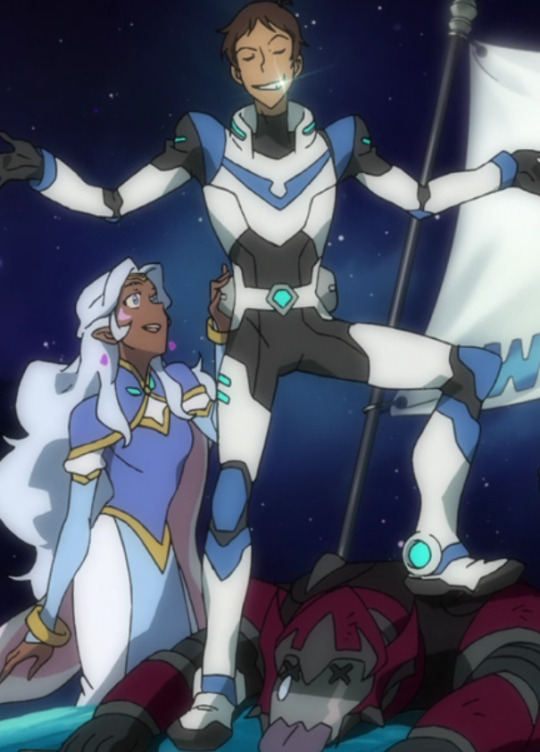
(Photo IDs: Lance taking selfies with aliens excited to be around paladins. A second screenshot of Lance daydreaming about being a universal savior, stomping on Zarkon, planting a flag to mark ownership, and having Allura stare up at him in worship.)
In fact, a lot of the pro-Voltron war propaganda relies heavily more on recreating the legend already built for them, than on the actual competency or experience of the current paladins:
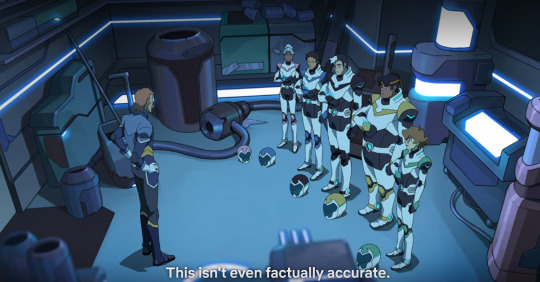

(Photo ID: Pidge complains about the war propaganda scripts, “This isn’t even factually accurate.” Coran replies, “Well, this is the Legend of Voltron, not the documentary of Voltron.”)
On that note, we even see the scripts reverse who is actually the most competent or capable of performing.


(Photo ID: Coran says, “Ladies and gentle-aliens, bear witness as the Paladins of Voltron attack Zarkon’s base to save the helpless Princess Allura!”)
Coran’s script, however well-meant, pretty massively infantilizes Allura as someone who needs to be saved by an external force, rather than mentioning her as someone who is an active and critical ally of the Voltron paladins in this war.
Unlike Coran’s script, Princess Allura isn’t helpless. In terms of the second-generation paladins, she’s has the most war-time experience, and is also the one that the paladins lean on constantly to create a meaningful connection with other people groups who are otherwise hesitant about Voltron.
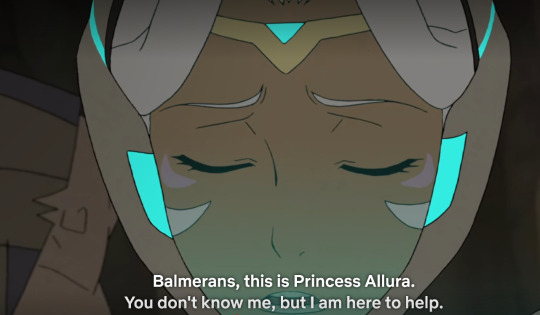

(Photo ID: Allura speaks to the Balmeran people, “Balmerans, this is Princess Allura. You don’t know me, but I am here to help. I know what it’s like to watch your home planet die.”)
Allura is the successor to the Altean monarchy and a direct victim of the OG galaxy wars. So unlike other second-gen paladins, she has some semblance of legal/political authority that she was actively trained for, as well as personal skin in the game. She is ultimately the only paladin who has experienced a mass omnicide of her home and people, similar to other victims of the Galra regime. She also still accepts the authority of her father, whose AI tells her in season 1 to be prepared to sacrifice everything to undo his mistakes.
We see Allura from that point onward functioning under that directive from her father and king—to sacrifice everything she has to end Zarkon’s regime. One could potentially make the argument that, within this structure, Allura might suffer from a certain subset of “white knight syndrome,” in which one feels they’re worthless if they’re not sacrificing for others. If I have my facts right, it’s a different psychological state from white savior complex (in which I define white savior complex as “when someone outside the issue at hand barges in to make a change that may or may not benefit the recipient, simply to make themselves feel better or appear useful, without regard to the recipient’s wishes or real needs”). But I feel even the comparison of “white knight syndrome” gets dicey. Because Allura is shown as acting happy without necessarily sacrificing things (in fact, she acts progressively depressed s7-s8, the more she has to give up intrinsic things about herself or her identity). But when Allura chooses to assist or sacrifice, the sacrifice she makes has a very relevant and functional impact for the people she helps.
In season 1, she chooses to sacrifice herself to save Shiro. Shiro was, at that time, the Black Paladin and leader of Voltron, so Allura saw herself as functionally the less important of the two to save since she did not pilot the universe’s only weapon against Zarkon.
With the Balmera, she similarly chooses to act because the Balmerans themselves acknowledge they are entirely out of options, and also because the Balmerans (and the Balmera itself) accept her help she offers. At this point in time, she has already established a deep personal connection with them by virtue of their shared trauma of losing their home planets.
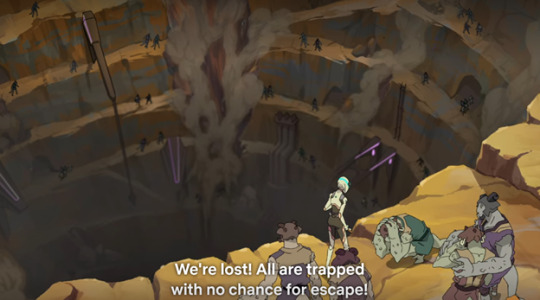


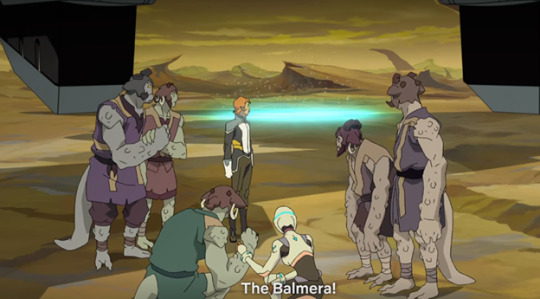
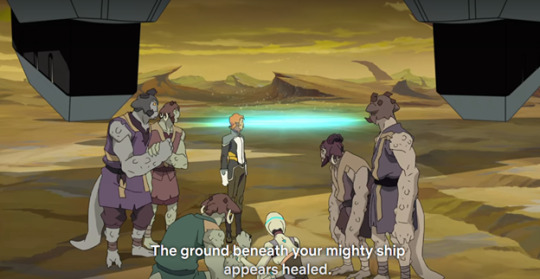
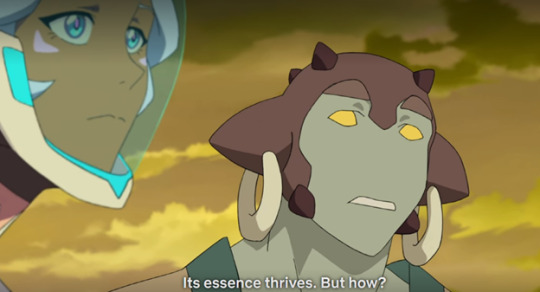
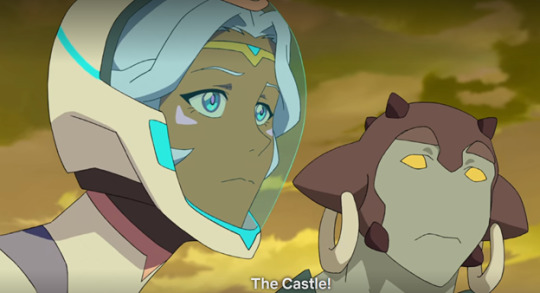
(Photo IDs: Shay says, “We’re lost! All are trapped with no chance for escape!” Allura says, “We can’t give up.” Shay responds, “But what can be done?” The group realizes the Balmera is regenerating beneath the ship, and Shay wonders why. Allura says, “The Castle!”)
Here, Allura assumes that the Castle—which is powered by a Balmeran crystal itself—could be regenerating the Balmera. But a Balmeran elder corrects her:

(Photo ID: A Balmeran elder says, “Not just the Castle, but you, as well.”)
So Allura did not even recognize at first that she was in any way a part of the solution to the Balmera regenerating.
Regarding the Balmera act itself, I’m not sure it satisfies the conditions for a white savior complex? I’m curious about your thoughts here, because I guess I saw it happening differently, from a witchcraft perspective...
We know from both Coran and Shay that originally, Alteans were one of the historical races who sacrificed some of their own energy to replenish the Balmera when seeking a crystal:
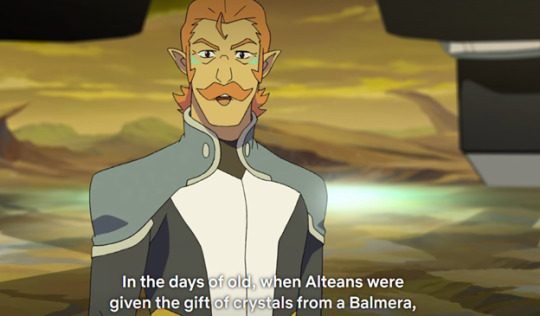

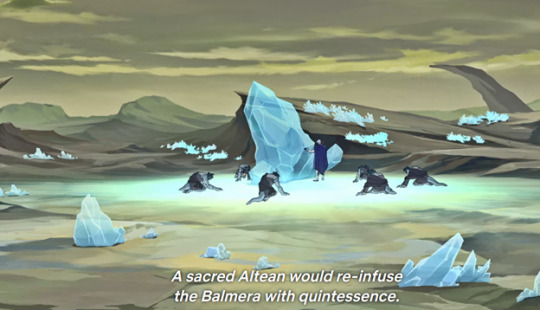
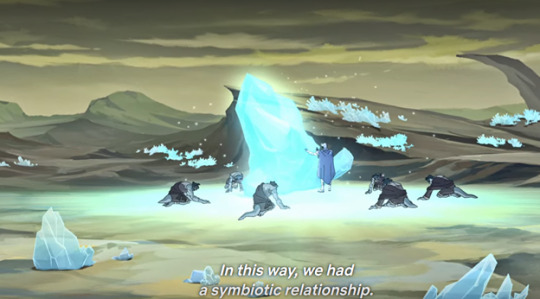
(Photo ID: Coran saying, “In the days of old, when Alteans were given the gift of crystals from a Balmera, we would repay its sacrifice by performing a ceremony. A sacred Altean would re-infuse the Balmera with quintessence. In this way, we had a symbiotic relationship.”)
We see that Balmerans were a voluntary part of this energy exchange by virtue of their unique connective powers (which is likely why we see them kneeling and activating said powers during these ceremonies).
Shay herself seems to indicate she is highly aware of these old ceremonies:
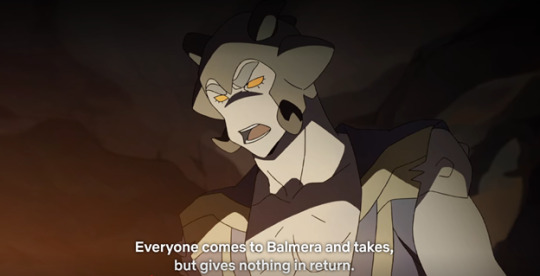
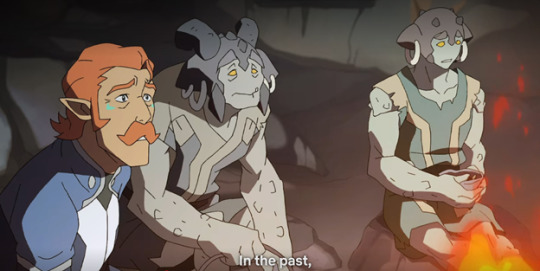
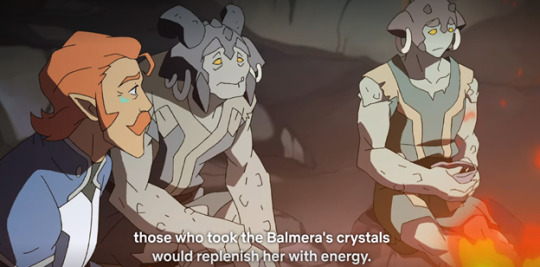
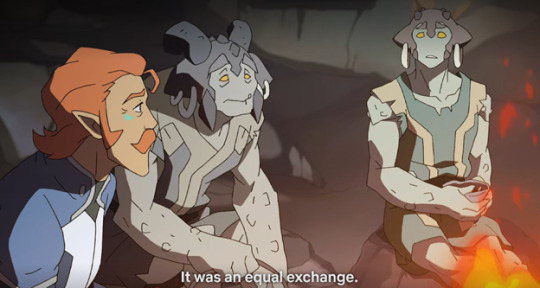
(Photo ID: Rax says, “Everyone comes to Balmera and takes, but gives nothing in return!” Shay says, “In the past, those who took the Balmera’s crystals would replenish her with energy. It was an equal exchange.”)
Shay agrees that the ceremony itself involves a sacred exchange of life force.
So I would argue that in this case, the Balmerans are not kneeling to Allura specifically or worshiping someone—it seems to be just the imagery associated with magical spells/magical transfers (where one object in the middle is the main conduit/focal point, and the other objects surrounding help to create and sustain the spell/protective barrier, etc).
One of the basic practices in real-world witchcraft is casting a magic/ritual circle. The circle creates a space where the spell, ritual, or form of protection can be performed. Forgive the stock image, but here’s just a super basic example:

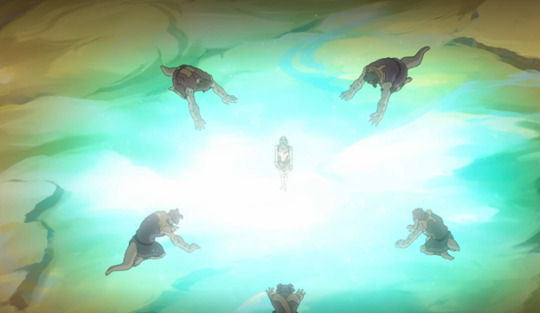
(Photo ID: A magic circle in the form of a pentagram, with a candle in the middle, compared to a screenshot of 5 Balmerans surrounding Allura in the form of a pentacle, creating a sacred space with Allura glowing in the center.)
The five points in particular mimic standard pentacle-based ritual circles designed to create a sacred space of some kind. We do see various configurations of witchcraft imagery used in other instances throughout the show, such as when the druids have to help Haggar sustain her spells:
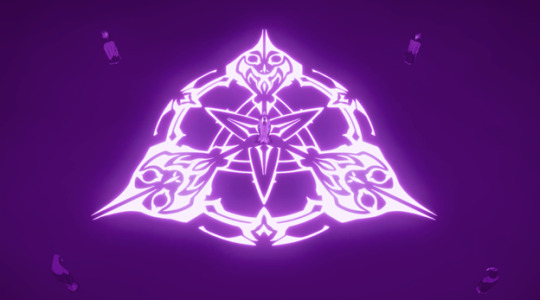
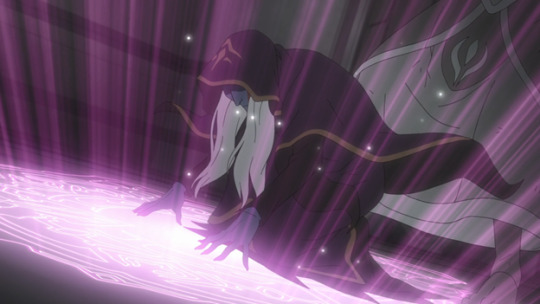
(Photo ID: Haggar centered in a magic circle, surrounded by druids helping her complete the ritual. Haggar kneels against the glowing symbols to complete the ritual.)
I think, similar to the druids that Haggar relied upon to help her complete a spell, it can be argued that the Balmerans were an active part of the regeneration spell with Allura. We see across the entire Balmera that they magically connect to help sustain the energy transfer, because it’s a planet-wide, massive undertaking:


(Photo ID: Balmerans activating their connection to the Balmera in the middle of the sacred ceremony to regenerate the Balmera.)
To me, it felt like the Balmerans were necessary to complete this ceremony--without their agreement to this energy exchange, and without them connecting to the Balmera to assist the transfer, Allura might not have been able to connect her life force and transfer power to the whole planet.
And to complete the ceremony, Allura herself kneels as well, just as Haggar did and just as the Balmerans around her do, in connection with the Balmera:
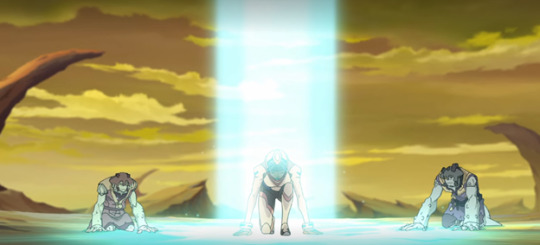
(Photo ID: Allura kneeling alongside Balmerans to complete the ritual.)
(Which means she’s technically kneeling to at least three other Balmerans in front of her.)
So I think the kneeling imagery would not correlate to some white savior complex event as suggested.
One other thought I had is that I feel help from a “white savior” is often haphazard and pushed onto recipients regardless of their thoughts or real needs. In comparison, we know that the Balmerans were willing to try this spell with Allura and accepted her idea of attempting the ancient ceremony. The only person who expressed hesitancy is Coran, who warns Allura that this attempt could kill her.

(Photo ID: Coran warns Allura, “To heal an entire planet, it could take more energy than you possess.”)
I do think it could again be argued that Allura seriously undermines her own value and worth in an attempt to help everyone, no matter the cost, which potentially gets more into white knight syndrome born out of trauma than white savior complex born out of privilege. She snaps back at Coran for being concerned about her well-being, and then she proceeds to enact the ceremony, not knowing for sure whether she’d live or die. But Allura also knows that her life force is uniquely tied to Voltron and that she is the only one with this kind of connection to the Castle ship’s battle-class Balmera crystal—all of this makes her a very powerful capacitor in a lot of ways. Which is why she looks like this after the ceremony:
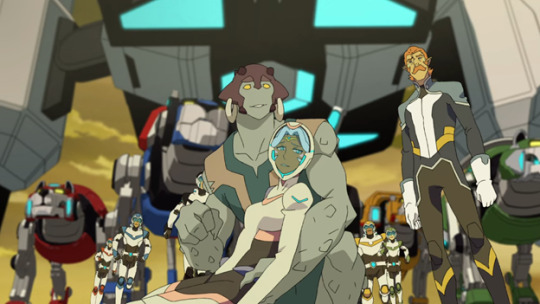
(Photo ID: Allura having collapsed in Shay’s arms after regenerating the Balmera, but her physical features are not otherwise affected.)
And not like this:
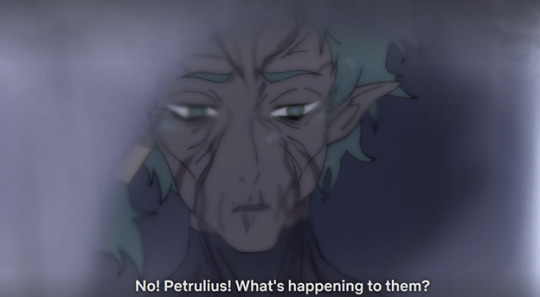
(Photo ID: A screenshot of an Altean named Petrulius from season 6, whose features are distorted after having had the life/quintessence sucked out of him.)
So to me, it seemed that Allura was enacting an ages-old, magical ceremony approved by and wanted by the Balmerans—simply on a scale that no one had ever before attempted. And it’s likely that no one else would or could attempt it, because Allura is the single character in the entire universe whose personal life force is tied to Voltron’s regenerative energy (by virtue of Alfor’s alchemy on her as mentioned in episode 1). It’s an even deeper tie to the whole machine than the transient bond between paladin and lion. No other Balmeran or Galran or Altean had that kind of tie in their life force. Likely, even Alfor would have died if he’d attempted this act himself without being connected to an infinite power source.
And after Allura saves the Balmera with assistance from Balmerans, we also do not see her like this with the Balmeran people:

(Photo ID: Lance soaking up a savior fantasy as previously mentioned in this meta.)
Instead, post-Balmera resurrection, we see it’s actually not even the Balmerans themselves who thank Allura. The Balmerans simply convey the will of the Balmera, which Allura cannot hear:

(Photo ID: A Balmeran says to Allura, “Yes. The Balmera lives. It thanks you.”)
So backing up for a second, I do think there are much larger issues happening in the narrative with Voltron itself, with the unequal power dynamics of having young, inexperienced people from a single planet make and enact all the big universal decisions. But in the instance with the Balmera, it seemed like Allura was openly welcomed to help save the planet, using magical ceremonies as approved by the Balmerans themselves for millennia, and that the Balmerans were not passive in those ceremonies but a necessary part of their success.
In general, Allura doesn’t seem to embody the “white savior complex” vibe at all to me, unlike some others in the show. Even in season 8, when Allura planned to make The Really Big Sacrifice, she asked her team to keep her actions a secret. She literally didn’t care for any respect or acknowledgment or prestige in exchange for sacrificing her life. She was doing what needed to be done because she was, once again, one of the few who could even perform at that level:
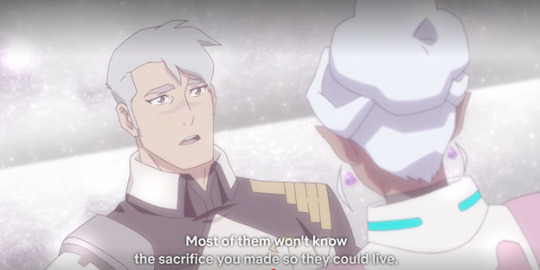
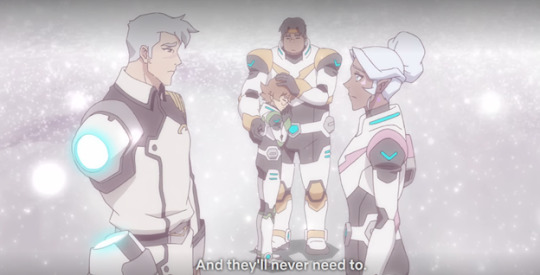
(Photo ID: Shiro says to Allura, “Most of them won’t know the sacrifice you made so they could live.” Allura replies, “And they’ll never need to.”)
(As an aside, I would argue that it was entirely unnecessary that the narrative would demand Allura sacrifice herself at all when she was literally standing in the universe’s seat of power alongside other powerful beings like her own father or the billions of other magic-wielding dead people, because apparently the lines between life and death blur in that space.)
(I also think there are some questionable “master race” vibes in the VLD universe in general, given that it forcefully pushes, even against the wishes of Alteans themselves, that Alteans are the only ones who can wield the big power to do big things. It’s clear that other groups and beings can wield magical abilities, but the larger narrative very oddly pins the ���purest quintessence/bluest blood” back on Alteans time and time again in later seasons, leaving Allura in basically a no-win, no-help-available situation until other Alteans come along.)
So yeah, I hope something in this meta might help settle some concerns about Allura as a representation of white savior complex? Or at least that this would open conversation for further discussion about what could be done in future iterations to avoid that messaging. Because yeah, I agree with you that the unquestioned savior complexes in this show are a topic that can and should be discussed! And also that, despite early world-building to suggest otherwise, the narrative especially in s6-s8 pushes that Alteans have a “purer/more alive” life force compared to any other race or form. Which is just…hm. Like, the master race vibes of all that are weird and definitely not even inherent to the Voltron franchise. (In previous iterations, humans, Galrans/Drule, and Alteans could all perform incredible levels of magic. For example, in Dynamite Voltron, Keith, Lotor, and Lotor’s siblings had all been taught magic.)
There’s definitely some weird images and unnatural power dynamics in VLD at times. It seems like more often than not, the narrative does strive to make Allura sacrificing something the only viable resort for anyone ever. In those circumstances, I’m just not convinced that she herself functions as an embodiment of white savior complex, by virtue of her behavior in those instances. But it’s definitely weird that the narrative places so much weight on her when the larger Team Voltron narrative is supposed to be about found family and strength in unity.
(If you read this far, thank you! Sorry I’m not succinct.)
#Voltron#Voltron meta#Voltron critical in ways#Allura#Balmera episode#discussions of white savior complex#I ultimately state that Allura doesn't seem to meet the basic behaviors for that#but the show does get into some strange master race stuff in terms of abilities#and we do see several iimages of white savior complex throughout the show by virtue of some other characters#which idk why that got dropped in without at least a reflection on it#like I can handle problematic stories but prefer it when they know they're problematic lol#in VLD it felt like I was supposed to be cheering for those issues#that I wasn't supposed to question it or that I was supposed to actually connect with that fantasy#I feel like this is a really interesting topic because in other iterations there were other Voltrons#as in more people had similar machines#which I feel like helped to control the savior complex inherent in manning a powerful weapon#and in fact one iteration goes as far to say that voltron ISN'T special at all#which surprises various characters#Just a very different vibe from VLD entirely#I'm really fascinated by that#Anyway thanks for reading my rambles!
30 notes
·
View notes
Text
Sannin headcanons and thoughts
The last thing I would like to post for the sannin week. It is still 24.04 here! :D @sannin-central
This is long. Spoiler alert. Mostly Orochimaru, some Tsunade, a little of Jiraiya (because his story is pretty clear and spoken and idk what I can add). Also I recommend to read this meta about Orochimaru, it has influenced me a lot and has some good points. Sorry for any posible grammar mistakes. Also I really should put here a lot of references to the manga or anime but it was something that was piling up for a year and I'm soooooooo lazy. After all, those are just headcanons. Also: Im not excusing Oro's bad stuff here, Im trying to understand the reasons.
Ive already posted some hcs, here, here and here.

1. First if all, the chronology pic of sannin lifetime based on the info i found on naruto wiki and also some statements about wars from this post. It was tough considering what a mess naruto’s chronology is.
2. Sannin story shows what it cost to be a legend. They're like Team 7 but more realistic. Tsunade literally carried the war but left with nothing and developed a ptsd and have problems to just live on. Also anger control issues. I think she can be pretty bossy and stubborn which is not always nice. Jiraiya is the hero of the day but also very idealistic and can ignore some important details in the real word whether its the fight (he always injured during flashbacks maybe because each time he took too much to handle and on the one hand it's heroistic but on the other is a mistake that can lead your team to situations like in that Iwa cave) or your friends issues (I bet he saw what's going on but thought it's fine until Oro actually got red handed and left). He lives in his world and may have problems to get out to see it through someone else's shoes. As for Orochimaru, it seems like he was a normal guy for 20+ years (I mean, he didn't do crazy criminal shit and had something good in him and it was stated somewhere that it was his teammates influence. It is obvious they considered him as a friend, I don't thinks it was for nothing) but we mostly know his darkest side. Despite being a moster he is a human that have empathy and some ordinary human traits (man just decorates every bit of an environment he is in lol).
3. Tsunade was the leader of team Hiruzen.
4. Tsunade sometimes hit Jiraiya for some stupid things he did or said but never touches Orochimaru even if he did something same. Jiraiya complained about it once and almost got another hit.
5. Jiraiya had problematic parents that didn't care about him much and a lot of time he was wandering in the streets.
6. Judging by the look of Oro bangs and hair, he sometimes cut it off. A stress relief huh? And the fact that he doesn't do it now in Boruto..
7. It was shown that Tsunade and Orochimaru was acknowledged before they become a team. Maybe they did just before, or maybe some longer time before. I prefer the second option and hc that they met because both had no real friends - Orochimaru seemed weird and scary for everyone and Tsunade was Senju so everyone wanted to hang out with her but didn't really care. They weren't seen as what they were - people put the labels on them. But they didn't care about each other's labels and actually saw each other in true lights.
8. Tsunade knew it was an accident and it's not right but still she blamed Orochimaru for Nawaki's death for some time. It was something that seriously damaged their friendship and the team. Orochimaru was mad but also guilty, after all, he was responsible at least as a shinobi since Nawaki was under his watch. So he started to act cold and emotionless and was trying to distance himself from his teammates.
9. Jiraiya was in Ame while Dan died.
10. The whole his orphans mission was a bit irresponsible tbh. They already fought Hanzo and as he stated the conflict between Konoha and Ame is going to an end with Konoha's win. It's weird to stay here for three years in the middle of the war while there were other lands to fight. He left his teammates for some idea. Maybe that caused another crack in their team friendship.
11. If Tsunade would have find a way to live on with her trauma and follow the will of fire and stuff it would affect Orochimaru as well just as her grief affected him. It's like he would get an example that you can live on with this pain. So death isn't above human capability and we are not just the slaves of mortality (sounds stupid but i dont know how else to describe sorry). But as we know what he actually saw is that it broke her crucially to the point she couldnt be herself again. And so the death is above everything.
12. Oro wasn’t just acting as a cold pragmatic bitch in that cave but also tried to save Tsunade. Jiraiya knew it and that’s why he showed this sign to him like "I see what youre doing here" and that stunned Oro because he would prefer to look rather like a cold pragmatic bitch hehe
13. Just a thought. People in the village probably treated Oro as a foreigner or just wouldnt accept him because he looked so differently and had a weird attitude. That's why he sometimes didn't feel that Konoha is his home. After the wars where people were treated as means and tools, even the children, he himself developed this view on people - he dehumanized them and used as the means to his goals, just as his village did. Funny thing some people were straightly dehumanizing him too like Ibiki thought that he was a demon (tho he was a child). And he probably weren't the only one. Anyways the point is that it's logical that Orochimaru don't care about anybody but some few people, he's the product of his era. He's like Naruto that would chose the hatred way. But naruto had some good and understanding people around him and.. Orochimaru had them too, but match how Iruka treated Naruto and this Hiruzen's "I sAw tHe mAliCe in This cHiLd fRoM tHe BegGinNinG". And oro didn't even have a big ass evil fox in him. sry i hate hiruzen
ANYWAYS the moral of the story is not "go criminal if they hurt you" but always treat people like people. Waving my hand to Kant.
14. The reason why Orochimaru didn't pick some good morals to stick with through the hard times no matter what (like, idk, Jiraiya or Naruto) is because 1) I think he is/was pretty depending on people around him 2) the war fucked him and his friends up too much (Nawaki incident + Tsunade) 3) twisted addictions (though I don't think he's that sadistic, we never saw him torturing randoms just for fun, it was always some science experimental shit. He tends to get fun out of cruelty only when it's personal) that maybe developed as a way to sublimate anger and sadness caused by his parents loss (that's what they share with sasuke - unlicke naruto, they knew their parents and it's other kind of pain. Sasuke developed a revenge issue and Orochimaru - cruelty pleasure which... is kinda the same but less epic and more occasional lol).
15. Speaking of that, Orochimaru cared for Sasuke because he saw himself in him.
16. Oro hold grudges against Hiruzen for not choosing him to be Hokage not only because he was ambitious and/or egoistic, but also because Hiruzen was some kind of a father figure for him and his approval was important tho i doubt he was aware of that. He also probably could tell that Hiruzen was suspicios about him when he was a child and that led to many conflicts and was hurting as well.
17. Tsunade knew things weren't pretty with Orochimaru after the wars but she never expected them to be this bad. During the week that she was given in her arc she thought not only about how much she wants to see Nawaki and Dan again despite how wrong would it be but also was trying to bury all the good memories she had left of Orochimaru so it would be easier to kill him.
18. She poisoned Jiraiya exactly because she knew he would not let her do it. Jiraiya was always hesitant to kill and inclined to forgiveness, while Tsunade, as mentioned by Orochimaru, could be merciless (so much so that he was not surprised when Kabuto suggested that she wanted to use Jira for Edo Tensei).
19. That was one of her traits that scared Jiraiya and fascinated Orochimaru.
20. Remember how Oro grabbed Jiraiya's neck when the latter was trying to cover with hair jutsu? On the snake, in Tsnade's arc. Orochimaru could have easily kill Jiraiya by pulling the sword out of the mouth (arteries are right there) but he didn't. As well as he could kill Tsunade when she was still shaking - just aim for the neck or the heart. Instead, he just injured her lung and kicked her which is not a big deal for the kind of shinoby like her at all.. Also he helped Anko not accidentally kill herself but it would be way much profitable to let her do it. "Orochimaru has no feelings".
21. The reason he suddenly wanted to kill Tsunade instead of forcing her to heal his arms as it was planned (which is weird since it will not going to get him heals and he kinda said that he wouldn't want to kill her just minutes ago) is that not only she refused to help him (he thought he could work it out) but she also prefered the village over him (from his point of view). Out if everyone she was the closest to being able to understand him since the village caused her painful losses too but nevertheless she agreed to be on it's side.
22. He wasn't fighting her back in the end partly because he thought he deserved that. Somewhere deep inside hahah.
23. Tsunade got a fear to develop deep bonds so they probably weren't very close with Shizune (also the way she knocked her down in this hotel.. oh).
24. Orochimaru will be here when she'll die.
25. Orochimaru's eng dub to Tsunade: "I often wondered what it would be like to ring that pretty neck yours". No comments.
26. Orochimaru is either bi/pan or ace. Anything or nothing lmao
27. Hiruzen knew about at least some of the Oro’s illegal experiments and was okay just as he was okay with the Foundation all the time. Because it’s useful. Then he has discovered he went too far OR he knew everything and oro just became too inconvenient because of his methods. The way Orochimaru tells Sasuke about reasons they are well treated as the criminals is based on in his experience with Hiruzen.
28. As you may know the lyrics in Orochimaru’s music theme goes “don’t talk with the silence of the heart”. It was taken from one Indian song that also had lines like “don’t question life too much”, ”pain arose somewhere in the chest”, “don’t speak to the wounds of the heart”. Though I’m not sure 100% because I was translating it with some hindi dictionary with like zero knowledge of hindi
29. I like to think that this “silence of the heart” theme and the fact that he called his village a hidden sound village are somehow connected. The hidden sound is the possible explanation of all things waiting to be listened to but the truth is silent and you know it deep in your heart and it bothers you. The world is silent just like the life is meaningless but people can only hear. *Sigh* anyways
30. Orochimaru’s journey is the one about accepting death. When he saw Karin released her chains while was trying to get to Sasuke he understood that the death is a part of human’s strength.
Can’t wait to feel that everything I wrote is wrong or not enough or stupid and obvious lol. Anyways, it’s something that I wanted to share until I move to some other fandom.
332 notes
·
View notes
Note
Lot I agree with and yes his problem with loss and the way he was brought up is significant.
Here's where I'm coming from though. Karuta itself as a game doesn't reallly matter. What matters in any of these types of stories is not the sport itself, what matters and always will are the characters and their relationships. The sport and competition are useful insofar as they serve as a playground on which these characters develop and interact.
What makes Taichi so interesting as a character is that his relationship with Karuta exemplifies this principle the most. There are different levels of complexities through which it is expressed. First of all there's what we're talking about which is his inability, because of the way he brought up, to deal with loss in a healthy way. We see this in the flashbacks when he's praised and pushed to be the best at even Karuta and he stoops so low to maintain that as to steal Arata's glasses.
But there's also another dimension to it which is his feelings for Chihaya. Huge part (maybe the main reason) of why he worked hard to excell at it is to get noticed by her since it's the thing that has taken her whole focus. That's why he wanted to win against her that badly.
Thens theres another layer to it which is Arata. His inferiority complex with regards to Arata signifies both "struggles". Arata is someone that he (believes) he can't beat. He thinks they're not or can't be even on the same level. That highlights his problematic relationship with losing and not being the best at something as he was pushed since he was a kid. But not only that, Arata's excellence at Karuta grabs Chihaya's entire attention. Her passion for the sport starts with him and he continues to be someone she looks up to. (She later develops her own reasons for reaching the top that has more to do with her rivalry with shinobu)
Apologoies for the long introduction. But this kind of mishmash of struggles and renaltionships fueled by his anxities and insecuries manifesting in his relationship with Karuta is exactly why I don't think like you think, which is that his arc is about coping with loss and therefore losing was necessary. That's merely one aspect to the story. There are different lessons that can be learned and each could take his arc in a different direction. Just to give you an example I can totally see a conclusion where he ends up with Chihaya but ultimately loses to Arata. The arc could be him learning that not being the best at Karuta isn't the end of the world and that appreciation and self worth dont and shouldnt come from his skill at Karuta. That lesson can be validated by Chihaya for whome excellence at Karuta was not a deciding factor in seeing his worth and deciding to be with him.
I could imagine the opposite where he does beat Arata but doesn't win over chihaya. And the lesson can be that it was insane from the beginning to try to win a person over using Karuta and how that developed an unhealthy relation in which he tied his self worth and performance and enjoyment of Karuta to Chihaya(we see that clearly since its been pointed out several times that when she's there he underperforms) . So "losing chihaya" to Arata wasn't the end of the world and his enjoyment of Karuta shouldn't depend on his attempt to win over Chihaya and that he can find fulfillmemt in working hard at something and excelling at it against all odds but free of the insecurities he brought with him initially.
There are many ways through which he can find self worth be it within Karuta or outside it. My problem with your take is as I said the emphasis on one aspect which is the competitive loss. (Also I think it's kinda misleading to talk about loss. He loses a lot and keeps pushing himself all the time. Sense of cope with not being the best or at Arata's level is more accurate). But if you add the Chihaya dimension you could make a coherent but also satisfying conclusion in which he loses in both aspects but finds self worth.
Guess my point is everyone should stop dismissing others criticisms and for everyone to stop seeing their interpertation as the only valid one.
P.s. I still prefer my arc in which he loses in all aspects but doesn't find self fulfillment either inside or outside of Karuta.
Sorry for rambling for so long.
I don’t mind rambling! I ramble all the time, as I’m sure you’re already aware, lol. And I think I understand what the miscommunication between us is now. I don’t think at all that loss is the all-defining trait of his character arc or the only one by which his character resolutions will ultimately be made. It’s just the one I’ve focused on specifically in my posts since yesterday because of the issue I had with people’s interpretation of that depiction of loss to begin with. I wholeheartedly agree that Taichi’s arc conclusion is also definitely going to take into account his feelings regarding Chihaya and Arata respectively; those are also really important closures he has to reach in order to be able to move forward, and they tie in just as heavily to his issues with self-worth. I’ve discussed those in detail elsewhere, though, so I wanted to focus on the loss aspect specifically with that post I made yesterday, because the overwhelmingly negative reaction to it kind of baffles me. That’s not to say that I think people with other view points are outright wrong or that people don’t deserve their right to criticism. Any narrative is going to warrant that after all, and that’s the beauty of discourse! But I feel like a lot of people who are upset with where Taichi’s arc goes tend to feel like Suetsugu abruptly ended it with the Qualifiers and defined it by that loss—even the main translation team that had been handling scalantions for years quit after the Qualifiers were over, because they weren’t satisfied with the direction his story took—and to me at least, I don’t think that was the end of his story, and there’s still resolutions left to be made by him afterward. I can definitely understand people still being doubtful to a degree, of course, but I simply hope people can be patient enough to see Taichi’s ultimate endgame before they decide whether what everything he went through was worth it or not and if that loss was really the end for him. I have my own doubts about things, too, but I want to afford Suetsugu that chance to prove herself first, I guess. I know that’s not something everyone will feel about similarly, but maybe I feel about it that way because I’m a writer myself. 😂
#this isn’t really specific meta or anything so i won’t tag it as such#but i hope this clears it up! it’s easy for things to get lost in translation in this kind of back and forth hahaha#i definitely feel like loss is at least really significant to him tho#and his relationship with it kind of works to reenforce some of his worst insecurities#or exacerbate some of his more unhealthy goals#like how he goes about pursuing chihaya or how he suffers in relation to arata’s success#so maybe thats’s why i stress it a lot here#but again i agree his feelings wrt chihaya and arata definitely work independently in their own way as well!#musings
1 note
·
View note